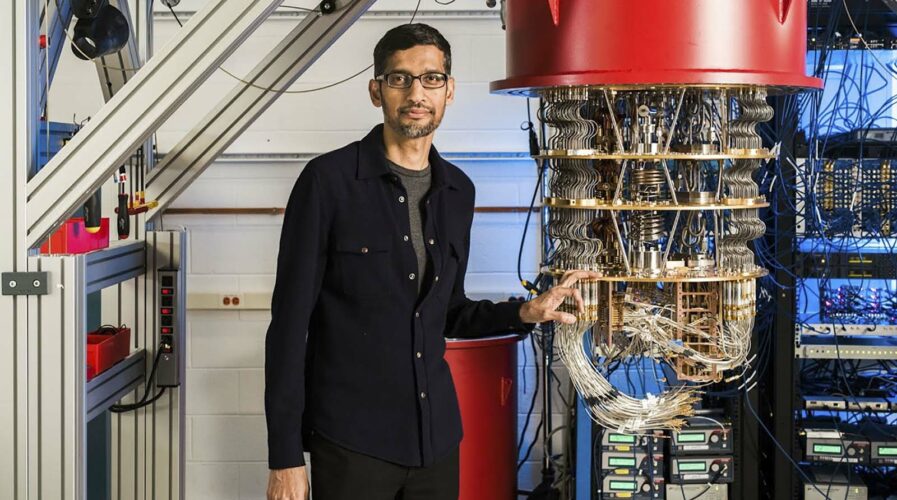
Are quantum computing as a service becoming mainstream? (Photo by HO / GOOGLE / AFP) / RESTRICTED TO EDITORIAL USE – MANDATORY CREDIT “AFP PHOTO / GOOGLE/HANDOUT” – NO MARKETING – NO ADVERTISING CAMPAIGNS – DISTRIBUTED AS A SERVICE TO CLIENTS
Is quantum computing as a service becoming mainstream?
- QCaaS will allow businesses to explore the benefits of quantum computing.
- After Amazon and Honeywell, Oxford Quantum Circuits has launched the UK’s first commercially available quantum computing as a service.
- Governments across the world are also pumping money into quantum computing with some countries around the world coming up with national quantum initiatives.
Quantum computing has been the cause célèbre among the tech community—thanks to initiatives by tech giants around the world. Every other technology company that we today count on—be it Amazon, Google, Microsoft, or IBM—is investing hugely in this revolutionary technology. But it doesn’t end there. In fact, more companies are now offering quantum computing as a service (QCaaS).
To first understand the potential of quantum computing, let’s take a look at the value it carries today. According to a Markets and Markets report, the quantum computing market is valued at US$472 million in 2021 and is expected to reach US$1.7 billion by 2026, at a CAGR of 30.2%. Banking and financial services are the two major sectors fuelling the growth of this market.
Google recently announced that, by 2029, it would build a quantum computer that would perform large-scale calculations without errors. At the Think 2021 event, IBM announced a 120x speed-up of quantum workloads with Qiskit Runtime. Goldman Sachs also announced recently that it is working on a quantum computing algorithm to improve its financial instruments.
Not just enterprises but governments across the world are pumping money into quantum computing with some countries around the world coming up with national quantum initiatives. In Asia alone, India’s Finance Minister Nirmala Sitharaman during budget 2020 announced the government would allocate Rs8,000 crore (US$1.08 million) over a period of five years, towards the National Mission on Quantum Technologies and Applications (NM-QTA).
Even Microsoft one year ago launched a new program to foster the building of quantum computing skills and techniques amongst the Indian academic community.
Then the South Korean government in 2019 announced an investment of US$40 million to develop ICT proprietary technology including core quantum computing. The government also plans to complete the development of a practical five-qubit quantum computer system with over 90$ reliability by 2023.
Japan on the other hand, will invest US$270 million over 10 years in quantum computing tech. The country has also launched initiatives to advance research and development in quantum computing. As per a media report, Japan is looking to build full-fledged quantum computers for a broad range of applications by 2039.
China, above all, stands as a leader in the global quantum computing race. In 2017, during the Chinese Communist Party’s 19th National Congress, President Xi Jinping declared that China must emerge as a global leader in innovation by 2035. Ever since then, the country has made large-scale investments in quantum computing to become a force to reckon with.
In 2016, the Chinese government introduced its 13th five-year-plan under which China launched a mega project for quantum computing and communication, including expansion of the national quantum communications infrastructure, development of general quantum computer prototype, and practical quantum simulator. China is also building a National Laboratory of Quantum Information Sciences which has been given initial funding of US$1 billion.
Quantum computing as a service platform in the market so far
Most recently, Oxford Quantum Circuits (OQC) has launched the UK’s first commercially available quantum computing as a service built entirely using its proprietary technology. Having built and launched the UK’s first superconducting quantum computer in 2018, the progress marks the first time OQC’s proprietary technology is available to the enterprise via its private cloud.
It also supports the startup’s goal of pioneering quantum computing as a service market. The new QCaaS platform will likely help boost the UK’s ambitions to be a global quantum superpower while also making it easier for businesses to explore the increasing commercial and technical benefits of quantum computing.
CEO of OQC Dr. Ilana Wisby believes the launch of their QCaaS platform is not only a remarkable achievement in the history of Oxford Quantum Circuits but a significant milestone in unlocking the potential of quantum computing both in the UK and globally. “By making our QCaaS platform more widely available to strategic partners and customers, we are offering the world’s leading enterprises the chance to demonstrate just how far-reaching quantum will be within their industries.”
Before OQC, Amazon and Honeywell were amongst the pioneers of making quantum computing as a service available to commercial organizations for experimentation.
READ MORE
- Ethical AI: The renewed importance of safeguarding data and customer privacy in Generative AI applications
- How Japan balances AI-driven opportunities with cybersecurity needs
- Deploying SASE: Benchmarking your approach
- Insurance everywhere all at once: the digital transformation of the APAC insurance industry
- Google parent Alphabet eyes HubSpot: A potential acquisition shaping the future of CRM


